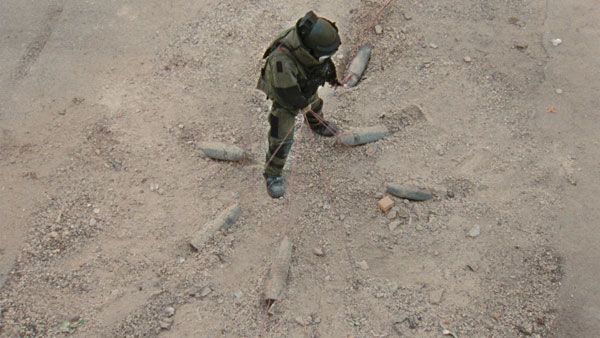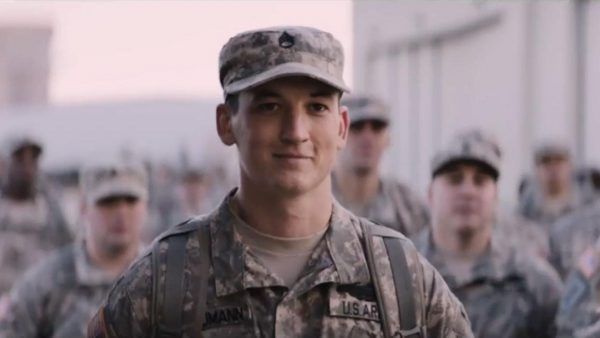The Iraq War began in 2003 after the Bush Administration cherry-picked intelligence to argue that there were Weapons of Mass Destruction that Saddam Hussein could use at any moment. The rationale became so skewed and doctored that at one point the Bush Administration argued that the Saddam had met with Al-Qaeda, thus providing a link back to 9/11. All of this led to thousands of dead American soldiers, countless more injured and traumatized, and an incalculable amount of dead Iraqis so that a bunch of neoconservatives could indulge their fantasy of regime change with no real idea how to pull it off.
Hollywood, eager to make topical movies, tried to make films about the Iraq War, but these largely tepid and milquetoast efforts have been mostly forgotten because they never question the machinery that created the war in the first place. The conflict was never between pro-war and anti-war, but rather that war is a given, it's complicated, but we can all agree to support the troops. We can't question the motives for sending them off to die in a conflict based on a lie, but we can agree that we should support them somehow.
This weakness is particularly apparent in films that tried to be relatively early out of the gate like Home of the Brave (2006), In the Valley of Elah (2007), and Stop-Loss (2008). All of these movies purport to look at the fallout of the war, but really it's only from the viewpoint of the average American serviceman. Furthermore, none of these movies can seem to reach beyond the fact that war is traumatizing, these soldiers are having difficulty readjusting to life outside of combat, and we need to look after them. And those are all fine points, but they're also on the same level as a "Support the Troops" bumper sticker. It's a fine sentiment that allows you to be sympathetic to those doing the fighting while at the same time never questioning those who demand war in the first place.
The turning point film is Kathryn Bigelow's The Hurt Locker (2009), which is a fine movie, but only excels in comparison to other Iraq War movies. While previous films worked to depict soldiers as damaged saints with only a couple of bad apples who might commit the occasional war crime, The Hurt Locker worked to depict its soldiers as humans with strengths and flaws. The protagonist, Sergeant First Class William James (Jeremy Renner), is an ace bomb technician, but his recklessness and need for adrenaline jeopardizes his fellow soldiers.
But even here, the most revolutionary statement that The Hurt Locker is willing to make is "war is a drug," which is a fine media critique and perhaps a critique on the American character, but the film refrains from digging any deeper into this particular conflict because by this point the Iraq War is six years old, and it's just a reality. There's no point in arguing over doctored intelligence or that Iraq fell into chaos because of monumental American incompetence. The war is here, and the best we can do now is empathize with American soldiers.
If there was one movie that could have dug into the morass of how we actually got to Iraq and how it went so wrong, it would have been 2010's Green Zone. The film is technically based on Rajiv Chandrasekaran's non-fiction book Imperial Life in the Emerald City, which chronicles the constant missteps and supreme arrogance of American officials that led to widespread chaos and constant war. Unfortunately, screenwriter Brian Helgeland and director Paul Greengrass basically just turned it into Jason Bourne Goes to Iraq. By 2010, we knew that the Iraq War was an utter debacle, but instead of showing us how it happened, we were fed more action movie bromides of tough guys doing tough guy things.
And then the Iraq War just became a part of American life. We wanted a troop withdrawal, but since there was no draft and a handful of American military families have to bear the full cost of service, as long as it was out of sight, it was out of mind. Hollywood would keep returning to the "Support Our Troops" movies like The Yellow Birds (2017) and Thank You For Your Service (2017) because it's easy to create drama by empathizing with an individual soldier. Even a commercial hit like American Sniper (2014) dwells more in the realm of hero worship than looking at the larger scope of the conflict. But if you want to take on the institution, you can see how "Support Our Troops" goes from being a shield for service members and a cudgel for the Military-Industrial Complex.
If you start poking at the very nature of war, then you can be seen as criticizing the troops. Hollywood doesn't know how to thread that needle of saying you can be against war while still supporting the people who fight in that war. By making the troops the face of the war effort rather than the politicians and lobbyists who put those troops in harm's way, then the people pulling the strings are shielding themselves from criticism while batting down anyone who would dare question the "service" of these troops who had no say in where they were sent, why they were fighting, or when they'll come home.
Hollywood's unwillingness to criticize the larger forces at work, especially in the midst of the conflict (sharper critiques like 2010's Fair Game only came around during the Obama Administration) created a bunch of soft dramas that carry the appearance of importance but studiously avoid pissing off powerful interests or doing anything that could be interpreted as anti-troop. This allows the Iraq War to remain unquestioned with one of our most important tools of mass communication, cinema, refusing to educate the populace on how America conducts war in the 21st century. Instead, war simply happens and if you want to see a movie about it, you'll learn that supporting the troops is good. With such facile premises, it's no wonder why so many of these movies have been utterly forgotten.



